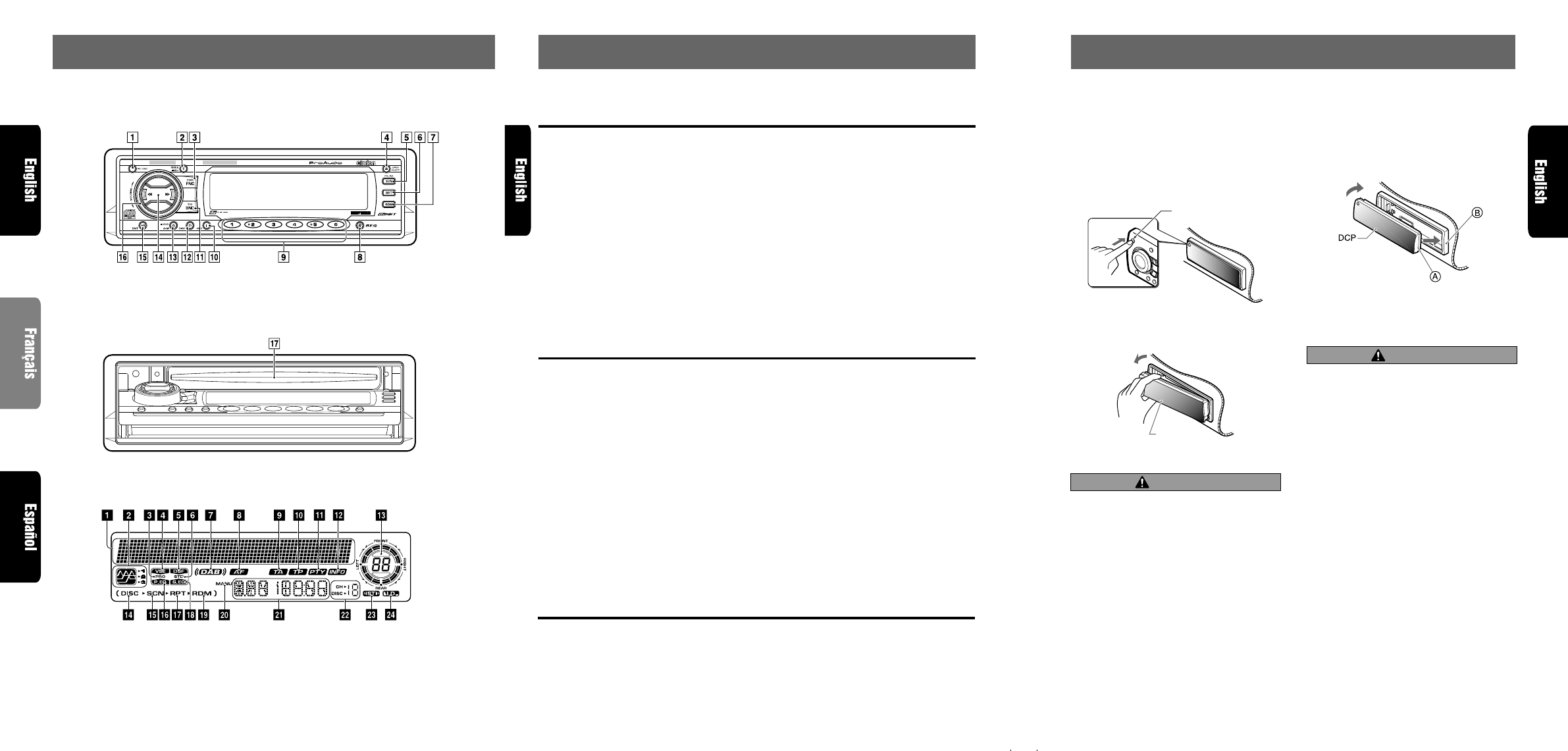
280-7659-00
5 DXZ715/HX-D10 6 DXZ715/HX-D10 DXZ715/HX-D10 7
4. NOMENCLATURE
Note:
• Be sure to read this chapter referring to the front diagrams of chapter “3. CONTROLS” on page 5 (unfold).
Names of Buttons
3.
CONTROLS / LES COMMANDES / CONTROLES
Source unit / Appareil pilote / Unidad fuente
Note: Be sure to unfold this page and refer to the front diagrams as you read each chapter.
Remarque: Veuillez déplier cette page et vous référer aux schémas quand vous lisez chaque chapitre.
Nota: Cuando lea los capítulos, despliegue esta página y consulte los diagramas.
5. DCP
With the SLOPING CONSOLE opened / Avec la CONSOLE INCLINABLE
ouverte / con la consola SLOPING CONSOLE abierta
Display / Afficheur / Visualizador
1 RELEAS button
2 TITLE button
ADJ (adjust) button
3 Power button
FNC (function) button
4 OPEN button
EJECT button
5 PS/AS (preset scan/auto store) button
SCN (scan) button
6 RPT (repeat) button
7 RDM (random) button
8 BEQ(Beat EQ) Button
9 Preset button (1 to 6)
Direct button (1 to 6) (7 to 12)
! ISR button
" BND (band) button
TOP button
# DISP (display) button
$ LOUD (loudness) button
A-M (audio mode) button
% SEARCH button
& Play/pause button
ENT (enter) button
( Rotary knob
) CD insertion slot
Display Items (Function mode)
1 Operation status indication
*Title, clock, etc. are displayed.
2 BEQ indication (BEQ: Beat EQ)
3 Professional mode indication
4 VSE indication (VSE: Virtual Space Enhancer)
5 DSF indication (DSF: Digital Sound Field)
6 STD mode indication (STD: Standard)
7 DAB indication
8 Alternative freguency indication
9 Traffic announcement indication
! Traffic programme indication
" Programme type indication
# Infomation indication
$ Clock (Clock indication) etc.
(A mode, FADER, BALANCE, etc. indications)
% Disc indication
& Scan indication
( Parametric egualizer indication
) Repeat indication
~ Graphic egualizer indication
+ Random indication
, Manual indication
- Operation status indication
*The frequency, play time, etc.
. Preset channel indication (1 to 6)
Disc number indication (1 to 12)
/ Stereo indication
: Loudness indication
LCD Screen
In extreme cold, the screen movement may slow down and the screen may darken, but this is nor-
mal. The screen will recover when it returns to normal temperature.
The control panel can be detached to prevent theft. When detaching the control panel, store it in the
DCP (DETACHABLE CONTROL PANEL) case to prevent scratches.
We recommend taking the DCP with you when leaving the car.
Attaching the DCP
1. Insert the DCP so that the A section on the
right side of the DCP catches on the hook B
on the unit.
2. Press the left side of the DCP carefully to fit it
in place.
CAUTION
• The DCP can easily be damaged by shocks.
After removing it, be careful not to drop it
or subject it to strong shocks.
• If the RELEASE button
11
11
1 is pressed and
the DCP is not locked into place, it may fall
out from vibration of the car. This can break
the DCP, so after removing it, either install
it on the unit or put it in its DCP case.
• The connector connecting the unit and the
DCP is an extremely important part. Be care-
ful not to damage it by pressing on it with
fingernails, screwdrivers, etc.
Note:
• If the DCP is dirty, wipe off the dirt with a soft, dry
cloth only.
Removing the DCP
1. With the SLOPING CONSOLE closed, turn
off the power.
2. Press the RELEASE button 1 deeply to open
the DCP.
RELEASE button 1
3. Pull the DCP toward you and remove it.
DCP
CAUTION
• Always close the SLOPING CONSOLE be-
fore removing the DCP.
• If you remove the DCP with the SLOPING
CONSOLE open, the sloping console closes
immediately. Be careful not to get your fin-
gers caught.


















